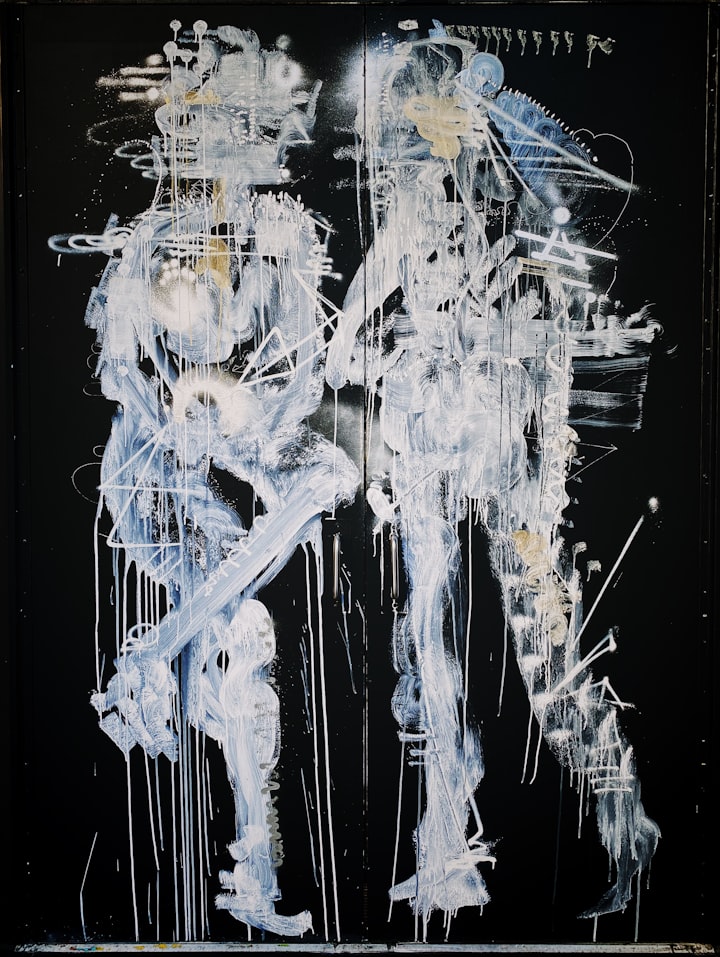
Collette awoke to the sound of birds.
In 1943 France, the gentle chorus of songbirds meant that the skies were clear and safe.
At seven, it meant a sunny day, good for playing outside.
Colette looked around her little blue room and smiled at her dolls and her toys. Her room was messy from playing last night, but she would not get in trouble.
“Not so long as I clean up before mẻre and pẻre get home,” she thought to herself. But then she remembered that pẻre had not been home since the snow started to melt. “That’s right,” she said aloud. Talking to herself became natural after so long alone. Hearing voices felt like hearing people, even if it was really just her own. “Pẻre will come back when the army comes back. He is keeping us safe. I have to be a big girl and a strong girl. So do Mẻre and Mẻmẻ.”
She sighed. “But Mẻre and Mẻmẻ are already big,” Colette said, picking up her favorite doll, Christiane, with a pout. “It’s not so hard for them.” She placed Christiane on her bed and pulled up the covers. “You can keep the bed warm for me,” the little girl said sweetly, patting the doll on her head. Then she began leisurely walking around her room, picking up her dolls, and sat them nicely on the window sill. “Here, now you can look outside. The sun is shining today!” Colette spun gleefully, her tangled, strawberry blond hair swaying around her. “Are you hungry?”
The dolls watched her with blank expressions.
“I am hungry. I will bring you something to eat.”
Colette walked down the stairs, holding the railing like her mẻre always told her to. She opened the windows around the house and smiled as the breeze rushed over her, bringing the sweet scent of roses from the garden.
“Oh, bonjour Joël!” Colette called. Her kitten, who had been in heavy pursuit of a bug of some sort, stopped and looked up at her.
“Mew,” Joël replied. He quickly abandoned his chase and sprang up onto the window box. “Mew, mew,” he whined repeatedly, rubbing his head against her. She kissed his nose and patted his head.
“Joël, you already know, I do not have any more milk. Don’t you remember? I told you yesterday. The soldiers needed the cow.” The little girl shivered slightly, remembering the shouting. “I think they were very thirsty for some milk.” Her voice was distant.
“Mew.”
“No, Joël,” Colette said, refocusing on her kitten. “You will have to drink water. And you can chase the bugs.” At that she promptly stood and climbed up onto the window sill. “Look, Joël! Watch how far I can jump!”
Colette lept from the window and into the garden. She looked around at the fruit trees, deciding what she wanted to eat.
“Not more than one, ma petite,” Mẻre had told her. Her mother was a beautiful lady- maybe the prettiest in the whole world- and very smart. “We want to make sure we have enough fruit to last us.”
See, very smart.
The sun shone across the leaves and flowers. There was a particularly red apple on the apple tree today- it was big enough to see from across the whole garden! She ran over and picked it. “Mhm! Joël, this looks delicious!” Collette bit into the plump red skin of the apple and the juice ran down her cheeks. She wiped her mouth with the back of her hand. “Wow. That is good.”
The little girl walked back inside, leaving the front door open behind her. She sat on the chair next to the bookcase- it was Mẻre’s chair, but she didn’t think she’d mind- and ate her little breakfast. Her eyes were wide as she looked around the room, wondering what she might do with her day.
“I think I would like to play the piano,” she announced to the books. Colette ran out to throw her apple core into the scrap pile in the garden and promptly returned, sitting on the piano stool and running her sticky fingers over the keys. She sat playing like that for perhaps even hours, picking whichever key she felt like and singing whatever words came to mind.
At noon she got up to eat some bread. “This is too hard,” Colette said with a pout. She put the bread on the counter and looked inside the pantry. There was no more bread. The little girl sighed and went back to the counter. Her little fingers stretched up to the sink and turned on the water.
“Just a little water will soften the bread,” Mẻre had told her. The stale bread soaked up the water like a sponge. “There, now it won’t be so hard. Take a bite, Colette.”
"Mẻre was right. It is not so hard now.”
Colette went outside and finished her bread in the grass, watching the ants climb up and down the base of the pear tree in quick succession. “I will have a pear for dinner,” she thought, licking the damp bread crumbs from her fingers.
Her eyes roamed around the yard and fell on the chicken coop. She walked over and looked inside. There were no chickens. There hadn’t been even since before the cow was taken, but she thought that she might should check all the same.
“No chickens,” she said, letting the door of the coop swing shut. Colette turned and wandered through the garden, too afraid to leave her home but not knowing what else to do.
The sun began to fall, and when it had become quite low in the sky, she went out to the pear tree for her dinner. “Pears are my favorite,” she told the tree. “So that makes you my favorite tree. I like when Mẻre puts you in the salads and in the pastries.”
Colette ate quickly and then ran inside. She closed all the doors and all the windows (except the one in her bedroom) just like she did every night and then raced to brush her teeth and jump into bed with Christiane before the sun had disappeared completely.
“Of course I’m not scared, Christiane. You shouldn’t be, either,” Colette whisphered, pulling the covers over her head. “But Mẻre says I must go to sleep early if I want to grow up big and strong, and I must be big and strong right now. Mẻre and Pẻre said so.” She closed her eyes and drifted away.
The sirens were screaming, but startled Colette awoke only to the sound of crickets.
“That is not a nice joke, Christiane,” the little girl said, frustrated. The doll stared back at her, motionless, expressionless, in the dim light of the moon. “I was sleeping so well. Now I have to try and go back to sleep.”
Colette closed her eyes and, after a few minutes, began to nod off.
“Quickly, under the bed,” Mẻre whispered. “Don’t come out unless I say so.” Her voice was calm and sweet, but her eyes were terrified. “Be very quiet. Do not let them hear you.”
“But Mẻre-”
“Don’t worry, everything will be ok. I will talk to the soldiers, but they are big and tired and hungry. They do not want to see a little girl because it will make them sad and then they will get angry. So you have to stay here.”
“Mẻre-”
“Promise me.”
“I promise.”
Mẻre dropped the sheet. Her footsteps became fainter as she hurried down the steps. Colette could hear them talking, then shouting. Mẻre was not happy. There was the sound of crashing and there was a scream. Colette shivered. The men were loud, boisterous, angry. She could hear them stomping around in the house.
Colette awoke with a start, but there was no one around and she was in her bed, not under it. She was not angry with Christiane this time.
“It’s ok, ma petite,” she told her little doll, squeezing her tightly. “I’m here with you. You aren’t alone. I’ll sing you a song so you can sleep.” Colette hummed until she drifted off to sleep again.
Collette opened her eyes slowly, waking to the sound of songbirds. At seven, it meant a sunny day, good for playing outside. She smiled, stretched, and jumped up from her bed.
“Good morning, Christiane! It is a beautiful day.” She picked up her doll, cradling her, and walked out of the room and down the stairs. “Let’s get some breakfast.”
The pear tree was full of fruit.
“Pears are my favorite!” She reached up and plucked a ripe pear, offered a bite to her doll, and then took a bite herself.
Suddenly, she noticed the sound of footsteps. Colette gasped. Dropping the pear and squeezing Christiane tighter, she spun toward the house and ran inside.
“Colette! Colette!” a voice called. She stopped. The voice was familiar. Colette turned and peeked from behind the cracked door. “Colette! I saw you. You don’t have to be afraid. It’s me!”
A woman came into view. She was tall and thin, with light brown hair and dark eyes.
“Tante Odette!” the little girl shrieked excitedly. In her amazement, she forgot all about Christiane and let her drop to the floor.
“Colette!” her aunt answered. She ran outside and hugged her tightly.
“Tante Odette, it is so good to see you.”
“I am so happy to see you, too, mon chẻri.” Her aunt put her hands on her shoulders and pushed her back, firm and gentle. “Let me look at you.”
“I did not brush my hair yet,” Colette explained. “But I am a big girl and I am a strong girl, and I have been taking good care of myself.”
“Ah-ha.” Her aunt looked over her carefully, noticing her scraped knee, the dirt on her toes, and the knots in her hair. “Where is your mother?”
The little girl looked down at the ground. “I don’t know,” was her quiet answer.
Tante Odette’s brow furrowed. “What do you mean ‘you don’t know’? How long has she been gone? When will she be back?”
Colette kept her eyes on the grass and wiggled her toes. It was a lot of questions for someone who’s just seven.
“I don’t know,” she finally answered, her voice breaking.
Little Colette began to cry.
About the Creator
Lucia B.
Poet
Novelist
Linguist & Aspiring Polyglot
Bibliophile






Comments
There are no comments for this story
Be the first to respond and start the conversation.